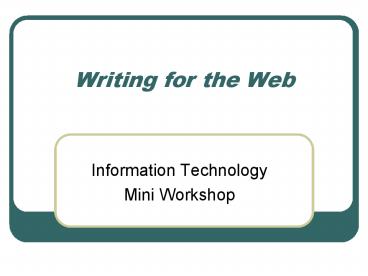Writing for the Web - PowerPoint PPT Presentation
1 / 21
Title:
Writing for the Web
Description:
Data, detail, and complexity are subjects for subsequent pages and should be logically placed ... http://hotwired.lycos.com/webmonkey/99/32/index0a.html ... – PowerPoint PPT presentation
Number of Views:67
Avg rating:3.0/5.0
Title: Writing for the Web
1
Writing for the Web
- Information Technology
- Mini Workshop
2
Basic rules of Web survival
- If you were asked to concisely say what a Web
site should be, what would you say? - Though it can be many things to many people,
- a Web site should be
3
Why Worry?
- Write for a reason and know why you write figure
out exactly what you are trying to accomplish
with your words and achieve that goal in the most
effective way possible - Purpose of a Web page
4
Why Use a Particular Writing Style?
- Main Goal
- Differences of Writing for the Web vs. for Print
- Tip Write consistently and keep info updated by
reviewing your web site and updating content
often.
5
Whos your Audience?
- Purpose for creating a web page is to have the
readers read the information provided - If you dont write for the reader, the reader
wont read!
6
How Users Read on the Web
- Readers focus attention on center of window where
they read body text before looking over
headerbars or other navigational elements - Usability
- Scan text
- Concise text
- Objective information
- Credibility
7
Why People Scan
- Reading from a computer screen
- Web is a user-driven medium
- Each page has to compete
- Modern life is hectic
8
Conventional Guidelines
- Carefully organize the information
- Use words and categories that make sense to the
audience - Use topic sentences-often only the first sentence
is read - Limit each paragraph to one main idea
- Provide the right amount of information
- Make proper use of links
9
Findings
- Simple and informal writing are preferred
- Credibility an Important Issue
- Humor should be used with caution
10
Improving Web writing style will result in
- Better use of users task time
- Fewer error rates
- Better memorability
- Improved site structure
- Improved subjective satisfaction
11
How to Improve Web Writing
- Scanning Ability
- Headings
- Larger Font size
- Bold or Italicized text
- Highlighted Text
- Graphics
- Captions
- Topic Sentences
- Table of Contents
- Bulleted Lists
- Concise Text
12
How to Improve Web Writing
- Use Objective Content
- Use Summaries
- Inverted Pyramids (Journalist Approach)
- Use Links
- Graphics
13
How to deal with longer copy, more text
- Use bookmarks on your page
- Place a list of links at the top of the page that
will take the reader to places lower on the page - Use the inverted pyramid structure
14
Organization Formatting
- The way your organize the information you include
in your pages helps provide context and meaning - Leave white space between paragraphs to enhance
readability
15
Design Worries
- Backgrounds
- Font Color
- Animations
- Usability (the users ability to get what he/she
wants from the site as quickly and as easily as
possible) should never be sacrificed for the
design - Tip unless the design is the point of your
site, select colors and visual elements that
support without dominating.
16
Review
- The topic, its main idea, and its conclusion
should be immediately visible, locatable, or
knowable - Ideas rule structure main ideas at the top of
the screen, with supporting and secondary
information below - Structure of the content and the website should
be readily recognizable to your visitor - Simple constructions are best limit one idea to
a group of words, whether sentence, phrase,
paragraph - Avoid technical terminology unless you clearly
and intentionally have its purpose in mind and
definition available - Data, detail, and complexity are subjects for
subsequent pages and should be logically placed
17
Review contd
- Each subsequent pages content should be apparent
by its link, and consistent with its predecessor - Detailed information can be accessed through
links for printing - Edit out the superfluous no matter how clever if
it detracts from your message - Spell check then have your pages independently
proof-read - Always focus on your message. Invite feedback
18
Final Note
- Because it is so easy to make changes to existing
content, there is this attitude of, we can
always fix this later. Unfortunately web pages
make it easy to let things slide because there
really is never a final draft.
http//www5.semo.edu/evans/Training/mistakes.htm
19
Resources of Information
- Stamats Communication, Inc.
- http//www.useit.com/alertbox/9710a.html
- http//www.useit.com/alertbox/whyscanning.html
- http//www.useit.com/alertbox/9606.html
- http//www.useit.com/papers/webwriting/writing.htm
l - http//www.useit.com/papers/webwriting/rewriting.h
tml - http//www.useit.com/alertbox/9703b.html
- http//www.iss.stthomas.edu/studyguides/writing_co
ntent.htm - http//www.dartmouth.edu/webteach/articles/text.h
tml - http//hotwired.lycos.com/webmonkey/99/32/index0a.
html - http//www.alistapart.com/stories/writeliving/
20
Checklist
- Scannable text
- Lists used
- Highlighted text
- Concise text
- Short Paragraphs-one main idea
- Proper use of headers/subheaders/sub-subheaders
- Correct amount of information provided
- Objective/Credible
- Inverted pyramid
- Organization/categorization
- Proper
- use of links
- graphic use
- Formatting
- Spell checked
21
Exercise Standard Questions for your Sites
Written Content
- Review your site and then have someone else
review it - Answer the following questions regarding your
site - What is the primary purpose of the site?
- Who is your audience?
- How would you describe the sites style of
writing? - How do you like the way it is written?
- How could the writing in this website be
improved? - How easy is it to use the website? Why?
- Do you have any advice for the writer or
designer? - Think back to another web site you have visited
and liked. Which site did you like better? Why?































